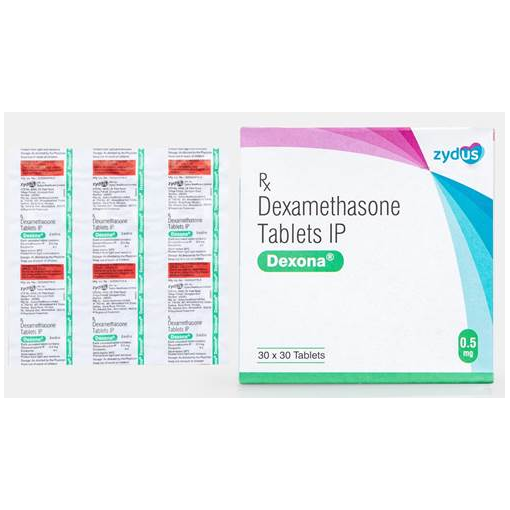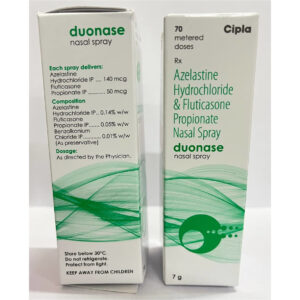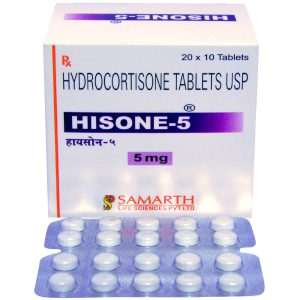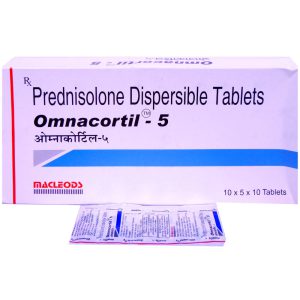Dexona Tablets (Dexamethasone) – Product Information
Dexamethasone, the active ingredient present in Dexona Tablets is a synthetic adrenocortical steroid, it is white in color, odorless, crystalline powder which is practically insoluble in water. Dexamethasone ia a member of the glucocorticoid class of steroid drugs. It acts as an anti-inflammatory and immunosuppressant. Dexona Tablets are used to treat various indications like severe allergic conditions, dermatological diseases, endocrine disorders, gastrointestinal diseases, hematological disorders, respiratory diseases, ophthalmic diseases, rheumatic disorders and other indications. Each tablet of Dexona contains 0.5 mg of Dexamethasone.
We also stock Duonase Nasal Spray (Generic Azelastine Hydrochloride Nasal Spray) which are used for the management of symptoms of allergic rhinitis, once the need for an antihistamine and corticosteroid has been established.
Name of Drug
Dexona Tablets
Manufacturer of Dexona Tablets
Zydus Cadila
Website: www.zyduscadila.com
Active Pharmaceutical Ingredient in Dexona Tablets
The active pharmaceutical ingredient present in Dexona Tablets is Dexamethasone.
Uses of Dexona Tablets
Allergic States:
Dexona Tablets are used to control severe or incapacitating allergic conditions which are difficult to treat using conventional treatment in asthma, atopic dermatitis, contact dermatitis, drug hypersensitivity reactions, perennial or seasonal allergic rhinitis, and serum sickness.
Dermatologic Diseases:
Bullous dermatitis herpetiformis, exfoliative erythroderma, mycosis fungoides, pemphigus, and severe erythema multiforme.
Endocrine Disorders:
Treatment of primary or secondary adrenocortical insufficiency,congenital adrenal hyperplasia, hypercalcemia associated with cancer, and nonsuppurative thyroiditis.
Gastrointestinal Diseases:
To tide the patient over a critical period of the disease in regional enteritis and ulcerative colitis.
Hematologic Disorders:
Used in the treatment of acquired (autoimmune) hemolytic anemia, congenital (erythroid) hypoplastic anemia (Diamond-Blackfan anemia), idiopathic thrombocytopenic purpura in adults, pure red cell aplasia, and selected cases of secondary thrombocytopenia.
Neoplastic Diseases:
For the palliative management of leukemias and lymphomas.
Nervous System:
Acute exacerbations of multiple sclerosis, cerebral edema associated with primary or metastatic brain tumor, craniotomy, or head injury.
Ophthalmic Diseases:
Sympathetic ophthalmia, temporal arteritis, uveitis, and ocular inflammatory conditions unresponsive to topical corticosteroids.
Renal Diseases:
To induce a diuresis or remission of proteinuria in idiopathic nephrotic syndrome or that due to lupus erythematosus.
Respiratory Diseases:
Berylliosis, fulminating or disseminated pulmonary tuberculosis when used concurrently with appropriate antituberculous chemotherapy, idiopathic eosinophilic pneumonias, symptomatic sarcoidosis.
Rheumatic Disorders:
As adjunctive therapy for short-term administration in acute gouty arthritis, acute rheumatic carditis, ankylosing spondylitis, psoriatic arthritis, rheumatoid arthritis, including juvenile rheumatoid arthritis. For the treatment of dermatomyositis, polymyositis, and systemic lupus erythematosus.
Dexona Tablets – Dosage
The recommended initial dosage of Dexona for oral administration varies from 0.75 to 9 mg a day, depending on the disease being treated. The dosage has to be individualized based on the indication under treatment and the response of the patient.
Storage Instructions for Dexona Tablets
Dexona Tablets should be kept at room temperature, 15-30°C (59-86°F) in a light-resistant, tight container. Keep away from children and pets.
Warnings and Precautions when using Dexona Tablets
Before using Dexona Tablets please inform your doctor about all the medicines that you take including no prescription medications, over the counter medicines and herbal remedies.
Rare instances of anaphylactoid reactions have occurred in patients receiving corticosteroid therapy. An increased dosage of rapidly acting corticosteroids is indicated in patients on corticosteroid therapy subjected to any unusual stress before, during, and after the stressful situation.
Cardio-Renal
Average and large doses of corticosteroids can cause elevation of blood pressure, sodium and water retention, and increased excretion of potassium. Corticosteroids such as Dexona should be used with great caution in patient with a recent myocardial infarction.
Endocrine
Corticosteroids can produce reversible hypothalamic-pituitary adrenal (HPA) axis suppression with the potential for corticosteroid insufficiency after withdrawal of treatment. Adrenocortical insufficiency may result from too rapid withdrawal of corticosteroids and may be minimized by gradual reduction of dosage.
Infections
Patients who are on corticosteroids are more susceptible to infections than are healthy individuals. There may be decreased resistance and inability to localize infection when corticosteroids are used. Dexona Tablets and Corticosteroids in general should not be used in the presence of such infections unless they are needed to control life-threatening drug reactions.
Ophthalmic
Use of corticosteroids such as Dexona may produce posterior subcapsular cataracts, glaucoma with possible damage to the optic nerves, and may enhance the establishment of secondary ocular infections due to bacteria, fungi, or viruses. Patients must be warned not to discontinue the use of corticosteroids abruptly or without medical supervision.
Side Effects of Dexona Tablets
The following adverse reactions have been reported with dexamethasone or other corticosteroids:
Allergic Reactions
Anaphylactoid reaction, anaphylaxis, angioedema.
Cardiovascular
Bradycardia, cardiac arrest, cardiac arrhythmias, cardiac enlargement, circulatory collapse, congestive heart failure, fat embolism, hypertension, hypertrophic cardiomyopathy in premature infants, myocardial rupture following recent myocardial infarction (see WARNINGS: Cardio-Renal), edema, pulmonary edema, syncope, tachycardia, thromboembolism, thrombophlebitis, vasculitis.
Dermatologic
Acne, allergic dermatitis, dry scaly skin, ecchymoses and petechiae, erythema, impaired wound healing, increased sweating, rash, striae, suppression of reactions to skin tests, thin fragile skin, thinning scalp hair, urticaria.
Endocrine
Decreased carbohydrate and glucose tolerance, development of cushingoid state, hyperglycemia, glycosuria, hirsutism, hypertrichosis, increased requirements for insulin or oral hypoglycemic agents in diabetes, manifestations of latent diabetes mellitus, menstrual irregularities, secondary adrenocortical and pituitary unresponsiveness (particularly in times of stress, as in trauma, surgery, or illness), suppression of growth in pediatric patients.
Fluid and Electrolyte Disturbances
Congestive heart failure in susceptible patients, fluid retention, hypokalemic alkalosis, potassium loss, sodium retention.
Gastrointestinal
Abdominal distention, elevation in serum liver enzyme levels (usually reversible upon discontinuation), hepatomegaly, increased appetite, nausea, pancreatitis, peptic ulcer with possible perforation and hemorrhage, perforation of the small and large intestine (particularly in patients with inflammatory bowel disease), ulcerative esophagitis.
Metabolic
Negative nitrogen balance due to protein catabolism.
Musculoskeletal
Aseptic necrosis of femoral and humeral heads, loss of muscle mass, muscle weakness, osteoporosis, pathologic fracture of long bones, steroid myopathy, tendon rupture, vertebral compression fractures.
Neurological/Psychiatric
Convulsions, depression, emotional instability, euphoria, headache, increased intracranial pressure with papilledema (pseudotumor cerebri) usually following discontinuation of treatment, insomnia, mood swings, neuritis, neuropathy, paresthesia, personality changes, psychic disorders, vertigo.
Ophthalmic
Exophthalmos, glaucoma, increased intraocular pressure, posterior subcapsular cataracts.
Other
Abnormal fat deposits, decreased resistance to infection, hiccups, increased or decreased motility and number of spermatozoa, malaise, moon face,weight gain.
Contraindications
Dexona Tablets is contraindicated in systemic fungal infections and in patients with hypersensitivity to Dexamethasone or any inactive ingredient of Dexona Tablets.
Use of Dexona Tablets (Dexamethasone) during Pregnancy and by Nursing Mothers
Corticosteroids such as Dexamethasone have been shown to be teratogenic in many species when given in doses equivalent to the human dose. Corticosteroids should be used during pregnancy only if the potential benefit justifies the potential risk to the fetus. Systemically administered corticosteroids appear in human milk and they could suppress growth, interfere with endogenous corticosteroid production, or cause other untoward effects. Since there exists potential for serious adverse reactions in nursing infants from corticosteroids, the doctor must decide whether to discontinue nursing or to discontinue the drug, taking into account the importance of the drug to the mother.
Dexona Tablets (Dexamethasone) Overdose
Treatment of Dexamethasone overdosage is only by supportive and symptomatic therapy. Supportive therapy may include gastric lavage or emesis in case of acute overdosage.
Buy Dexona (Dexamethasone) Tablets Online at Cheap Price
You can buy Dexona Tablets at a cheap price online from the Swiss Pharmacy. Dexamethasone Tablets are available in pills of 0.5 mg. The pills are priced at only 0.10 per unit, if you place an order for 600 pills.







